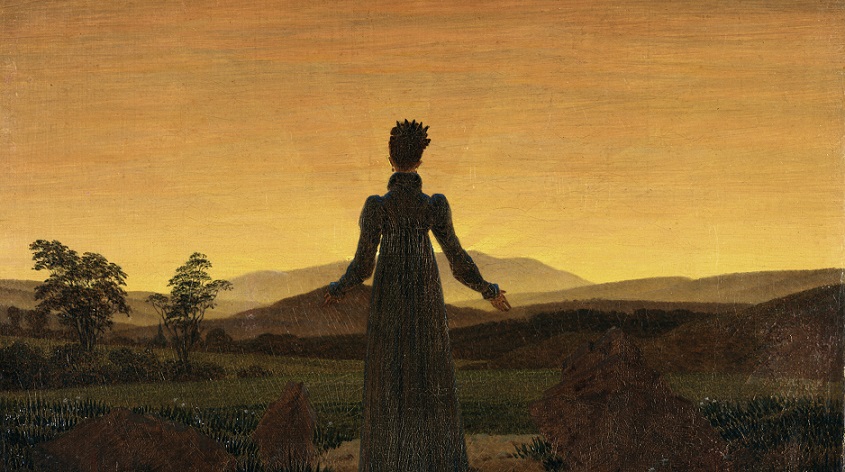.
The Shadow of My Sorrow
As soon as day has dawned and night is done,
The shadow of my sorrow follows me,
Outgrows the shape by which it came to be,
Consuming it when night is new begun;
And being my likeness, how can I outrun
My other self, since self from self can’t flee?
Thus it is bound to keep me company,
So long as I shall walk beneath the sun;
But why would I e’er flee from such a form,
Which holds me close, and never shall part ways;
Whose very blackness brightens bygone days,
And unconceals my star, who feels so warm?
Then am I right, or right at my wit’s end,
To think that sorrow’s shadow is my friend?
.
.
Daniel Joseph Howard studied law in his native Ireland before taking his MA in philosophy at King’s College London. After working in the European Commission, he is now pursuing a PhD in Philosophy at Boston College.















Certainly, a contemplative poem written from your philosophical soul. We all can cogitate over the answer to your final question much as you must be musing over it. There are some neat turns of phrase that are appealing, such as “Whose very blackness brightens bygone days…” I enjoyed your sonnet.
Thank you, Roy. I think that all of our souls turn a little philosophical in contemplation of such things.
A thoughtful and thought-provoking sonnet. I’ll never look at my shadow in the same light (?) again.
My fave line: ‘…how can I outrun / My other self, since self from self can’t flee?’
Thanks for the read, Daniel.
And I, for my part, appreciation the line “I’ll never look at my shadow in the same light (?) again.”
Connecting to one’s sorrow…..very relatable, Daniel.
Relatable indeed. But the best writers, in my view, can move us even when we cannot identify with or relate to their particular sorrow. The following speech by Constance in Shakespeare’s King John comes to mind:
Grief fills the room up of my absent child,
Lies in his bed, walks up and down with me,
Puts on his pretty looks, repeats his words,
Remembers me of all his gracious parts,
Stuffs out his vacant garments with his form;
Then, have I reason to be fond of grief?
As Roy and Paul have said, your poem is very thought-provoking. It raises questions without fully answering them– what is the source and nature of your sorrow? Who is the “star” whom sorrow´s shadow “unconceals” as the night sky unconceals a thousand stars made brighter by the darkness of a black backdrop– is that star a friend, a relative, a spouse. . . God? The enigmatic expressions you use add an air of mystery to the poem. The benefits you see in “sorrow´s shadow” calls to mind what the apostle Paul wrote about his “thorn in the flesh”– a source of deep sorrow in his life that turned out to be the very instrument God used to magnify His grace in Paul´s life, for by its abiding presence, Paul discovered that through the jabbing pain of this afflicting thorn that would not go away, God´s strength was perfected in his weakness.
Thanks Martin for the very interesting anecdote about St. Paul
This is as classic as it can get. One of the finer philosphical poems I have read in a long time, Daniel.
Hence, I could not stop myself from writing the lines below for you.
Thus sunshine shall hide behind the curtain
Of clouds and let this shadow bless your head
Like loving hands of God, when faith has fled
And Time’s no more a master, it’s certain
And clear that stars are to dark skies above
What these shadows are to the light of love.
Thank you for the kind comment, Satyananda, and especially for the lines you shared.
Looking forward to more poems from you.
Best wishes
It says something about the power of Daniel’s poem, Satyananda, that it inspired you to write lines of your own.
Excellent sonnet, Daniel. My favorite line is “Whose very blackness brightens bygone days”. I also like your use of “e’er”. With this sonnet, you make your sorrow sing poetically.
Thank you Cheryl, always nice to read your comments.
Daniel, this intriguing, beautifully written sonnet has the feel of a riddle… a riddle whose answer sends me straight back to the beginning for more clues. It seems this shadow of sorrow (only visible under the warmth and dazzle of the heavens) is responsible for drawing its owner to its Creator in a time of grief.
“Then am I right, or right at my wit’s end,
To think that sorrow’s shadow is my friend?”
I say yes to both… so, back to the beginning for this reader. I love it!
Dear Susan,
Thanks for your comment. Indeed, there is somewhat of a mysterious touch. I have often found that the mysteriousness of Shakespeare’s sonnets is partly why I keep going back to them. I think that, in certain contexts, we can sometimes say more by not saying enough.
I love this beautiful sonnet and will be ever mindful of the shadow of my sorrow. Thank you…Allegra
An excellent sonnet. I’m particularly fond of “unconceals my star.”
Daniel, you have written another fine sonnet. It’s very thoughtful, and it certainly got me thinking. I particularly like line six, which comes across as very Shakespearian.